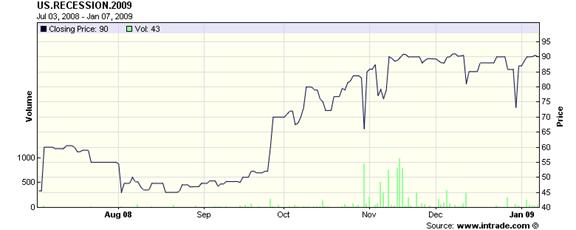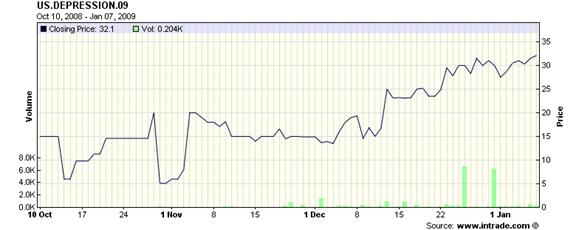-
Bloomberg.com – Caroline Baum: Herd Quits Eden for Land of Perpetual Recession
After a year of denying the U.S. economy was in recession, the herd has turned and is charging full speed in the opposite direction. Now there’s no chance we’ll ever get out of this mess. The financial system is broken. Banks aren’t lending. Housing supply exceeds housing demand. The Federal Reserve has no tools left. Consumers are tapped out. The unemployment rate is soaring. All of these arguments are true to some degree, and economists are hard-pressed to find any drivers of economic growth. That’s almost always the case. That’s almost always the case. Recession tends to make the future look bleak in the same way an expanding economy inspires confidence. The sentiment cycle is as predictable as the Earth’s orbit around the sun. In the stock market, sentiment is considered a contrarian indicator. If money managers are all bearish, it implies that everyone who needs to sell has sold, making way for a rebound in equity prices. -
MarketBeat (WSJ Blog) – You Say Recession, I Say Depression
With so many money worries out there, economists say the distinction between a recession and a depression is not worth one thin dime. While the former has a formal definition, the latter is not much more than an “extreme” version of the former. Merriam-Webster’s collegiate dictionary gives the definition of a recession as a “period of reduced economic activity.” And the National Bureau of Economic Research defines a recession as “significant decline in economic activity spread across the economy, lasting more than a few months, normally visible in production, employment, real income, and other indicators. Meanwhile, Merriam-Webster calls a depression a “period of low general economic activity marked especially by rising levels of unemployment.” The old saw that “it’s a recession when your neighbor loses their job, and it’s a depression when you lose your job” is probably as good as any.
Comment For trading purposes on Intrade.com, a recession is defined as two consecutive quarters of negative real GDP growth. The odds of this occurrence are shown in the chart below, and real-time updates can be found in the tables on the right side of this page.

A depression is defined as a cumulative decline in GDP of more than 10% over four consecutive quarters. The odds of this occurrence are shown below, as well as real-time updates in the tables on the right side of the page.

